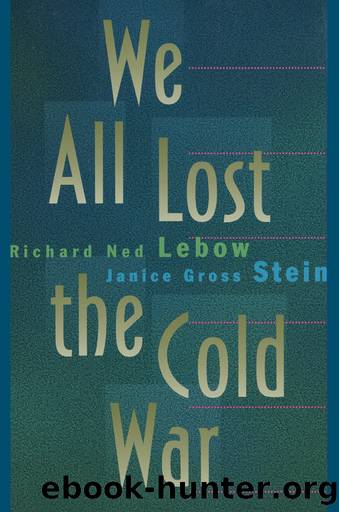We All Lost the Cold War by Richard Ned Lebow;Janice Gross Stein;

Author:Richard Ned Lebow;Janice Gross Stein;
Language: eng
Format: epub
Publisher: Princeton University Press
Published: 2022-12-30T00:00:00+00:00
Learning the Wrong Lessons
In the United States, the outcome of the crisis confirmed the lessons earlier leaders had mistakenly drawn from the Cuban missile crisis. It reinforced American confidence in deterrence and the political value of strategic alerts as an effective demonstration of resolve. Nixon and Kissinger were convinced that the Soviet Union backed away from the use of force because the United States âbared its teethâ and because its president had a reputation for using force.
Some scholars argued that it was the manipulation of the risk of war that deterred the Soviet Union and went so far as to claim that Israelâs observance of the cease-fire was irrelevant to the consequences of the confrontation between the superpowers.127 They considered the alert a model of successful crisis management. âOur traditional crisis management approach to the Soviets on the nuclear level,â Lt. Gen. William Odom observed, âhas been to escalate our threats very early to the highest level and then negotiate our way back down.â128 The resolution of the crisis at the end of the October War confirmed the correctness of that strategy in the minds of many in the policymaking community in Washington.
The Cuban missile crisis engendered a broad body of critical analysis and revisionist history. With a few important exceptions, there has been little critical evaluation of the crisis in 1973.129 Only a few analysts considered the worldwide alert an overreaction and questioned the efficacy and appropriateness of a worldwide alert of forces as an instrument of crisis management.130 One cogent critique argues that the restricted and low-key response of the American military apparatus was in part responsible for holding the seriousness of the crisis well below its potential.131 It is possible that a more concerted organizational response would have been more likely to risk escalation. As we have seen, however, Soviet officials did not respond to these kind of nuances, but to broad political considerations.
The capacity of the alert to deter was irrelevant because Soviet leaders had no intention of sending forces. The political implications of the alert were not irrelevant, however, insofar as it disappointed and angered Brezhnev and his colleagues. From this perspective, deterrence was not part of the solution; it was part of the problem.
There was also some reassessment by American officials of the impact of the changing military balance on the use of strategic alerts in the future. Henry Kissinger, for example, subsequently asserted that he would not have dared to order a DEFCON III alert at the end of the decade, given the shift in the strategic balance in favor of the Soviet Union.132 This reassessment by American officials is almost a complete reversal of the process of learning by participants in the Cuban missile crisis. Some members of the Ex Comm gave considerable weight to strategic superiority at the time but subsequently discounted its importance. In 1973, officials correctly gave little weight to the strategic balance, but years later inflated its importance.133 In so doing, they learned the wrong lesson. Our evidence
Download
This site does not store any files on its server. We only index and link to content provided by other sites. Please contact the content providers to delete copyright contents if any and email us, we'll remove relevant links or contents immediately.
| Africa | Americas |
| Arctic & Antarctica | Asia |
| Australia & Oceania | Europe |
| Middle East | Russia |
| United States | World |
| Ancient Civilizations | Military |
| Historical Study & Educational Resources |
Empire of the Sikhs by Patwant Singh(22772)
The Wind in My Hair by Masih Alinejad(4849)
The Templars by Dan Jones(4561)
Rise and Kill First by Ronen Bergman(4548)
The Rape of Nanking by Iris Chang(4024)
12 Strong by Doug Stanton(3420)
Blood and Sand by Alex Von Tunzelmann(3060)
The History of Jihad: From Muhammad to ISIS by Spencer Robert(2507)
Babylon's Ark by Lawrence Anthony(2433)
The Turkish Psychedelic Explosion by Daniel Spicer(2246)
No Room for Small Dreams by Shimon Peres(2240)
Gideon's Spies: The Secret History of the Mossad by Gordon Thomas(2238)
Inside the Middle East by Avi Melamed(2233)
Arabs by Eugene Rogan(2196)
The First Muslim The Story of Muhammad by Lesley Hazleton(2158)
Bus on Jaffa Road by Mike Kelly(2037)
Come, Tell Me How You Live by Mallowan Agatha Christie(2030)
Kabul 1841-42: Battle Story by Edmund Yorke(1927)
1453 by Roger Crowley(1881)
